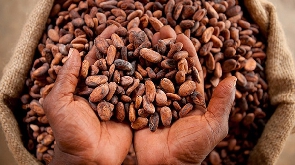Ghana is struggling to finalize this year’s cocoa syndicated loan agreement with international banks as they demand high premiums to hold what they fear could potentially become a “risky” debt.
The West African nation targets to raise $800 million for bean purchases this season, the lowest cocoa syndicated loan secured by the world’s second-largest producer in 18 years.
But Cocobod, the cocoa industry regulator, hopes to raise an additional $400 million from ‘other sources’ to bring the total amount to $1.2 billion, the head of public relations at Cocobod, Fiifi Boafo said without providing details.
“The lenders are charging a high premium on the facility but we are settling on something favourable. Our situation has improved from last year,” two sources with knowledge about the transactions said.
Banks have always considered the cocoa industry a safe bet. However, the prolonged negotiations highlight the growing concerns that Cocobod’s financial troubles and the economic headwinds could trigger a default.
“Syndicated lenders are familiar with Ghana’s cocoa industry, the financial risks and the problems of Cocobod. The IMF wants changes to help take off the invincible hand of the government in Cocobod's finances. All these events would likely translate into higher risk premium which may be too high,” Professor John Gatsi, Dean of Business School at Ghana’s University of Cape Coast said.
The regulator raised $1.13 billion at 1.75% plus Secured Overnight Financing Rate (SOFR) for the 2022/2023 season, down from $1.5 billion at 1.1% plus London Interbank Offered Rate (LIBOR) the previous season. It paid 1.5% plus LIBOR for the $1.3 billion received in the 2020/2021 season.
Cocobod has paid more in the last three years on its annual cocoa syndicated loans compared to the early years of this administration when it borrowed under 1%.
Loan delay sparks anxiety
Traditionally, the first tranche of the annual pre-export facility, which is repayable within a year, arrives between September and October every year, enabling Cocobod to bring in the beans in time.
However, it’s been two months since President Akufo-Addo launched the 2023/2024 cocoa season, and the syndicated facility is yet to arrive.
The situation has sparked anxiety among industry players, especially Licensed Cocoa Buyers who depend on the loan to augment their funds for purchases.
“The LCBs should be buying the cocoa by this time and that gives us some money to cater for our business needs. Things are quite slow,” a cocoa farmer who asked not to be mentioned said.
The government’s scramble to bring the economy out of storms not seen in decades, caused by a debt crisis, high inflation and weakened local currency, resulted in a restructuring of the country’s total public debt, estimated at $50 billion. This was to help qualify for a $3 billion bailout package with the International Monetary Fund.
Although the syndicated loans were spared the debt treatment, short-term securities issued by Cocobod – known as cocoa bills – to finance its operations were restructured. The bills, totalling 8.1 billion cedi at an average of 30% were converted into five new bonds at 13% yield, resulting in significant losses for investors who are largely local banks.
In January, matured cocoa bills were rolled over without prior notice to investors as the Bank of Ghana, which often rescues the industry regulator, agreed with the IMF not to intervene.
“The lack of investor confidence in the industry and other challenges at Cocobod could impact total output for this year if not addressed,” Professor Gatsi warned.
Ghana aims to increase output to 820,000 metric tons for the 2023/2024 season after missing its target in the just-ended season, occasioned by crop diseases, a weak currency and increased smuggling to neighbouring countries where prices were higher.
But the government has raised the farmgate price by more than 63% for this year, hoping to discourage smuggling to neighbouring Ivory Coast, the world’s largest cocoa producer, and improve farmer income.
In October, the country reached a staff-level agreement with the IMF on the first review of its bailout programme, and would receive a second tranche of $600 million pending agreement with creditors and approval by the Fund’s executive board.
Business News of Monday, 6 November 2023
Source: Sani Abdul-Rahman, Contributor
Demand for higher premiums delaying cocoa syndicated loan
Entertainment












